Reversal of Fortune
Pay Bonnie Raitt the ultimate tribute by voting on her birthday
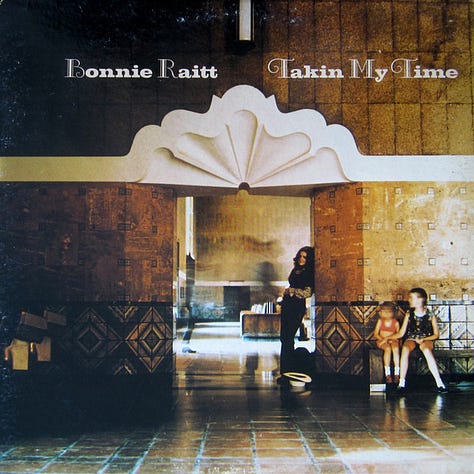
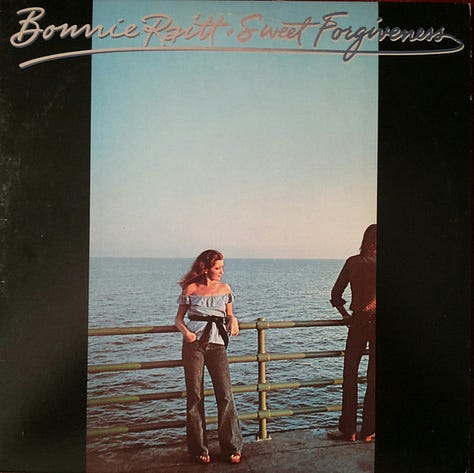
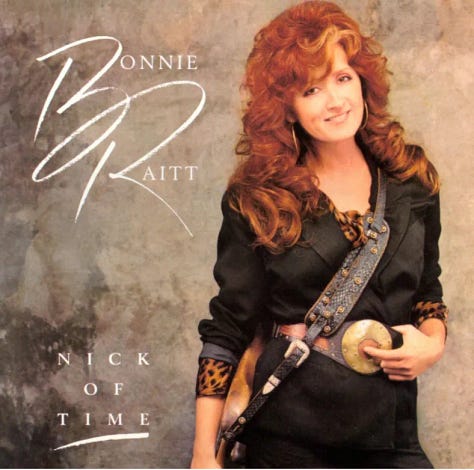
Nick of Time, Bonnie Raitt. (Capitol 1989)
Boston Phoenix, June 16, 1989
So many great tracks across a six-decade career, and you still want that fabled country album. As Jeremy Irons (as Claus Von Bülow) says in the film, “You have no idea…”
BONNIE RAITT'S COME-HITHER blues purr and spine-cracking gospel growl have always outclassed her various bands, producers, and too many of her songwriters. Her full-bodied, understated dramatic range and control make even her better back-up players hustle to keep up with her nuances. That range carries her best records from the early '70s (Give It Up (1972) and Takin' My Time (1973), even as her sassy, after-the-thrill-is-gone mojo tales wear thin.
With widespread critical acclaim but no big hits, Raitt made the rounds with a host of producers in the past decade: Paul A. Rothchild oversaw Sweet Forgiveness in 1977, until now her highest-charting LP, which featured the semi-popular single, a cover of Del Shannon's "Runaway," and Peter Asher tailored the lounge aura of The Glow in 1979. But no one seemed able to give her sound the requisite crossover bounce, or to adorn properly the embarrassment of riches in her voice. She acquired the reputation of a diva manqué and became as reliable onstage as she was unmarketable as a star.
The '80s brought fewer records, and she sank into a classic career quagmire. She was a force behind the No Nukes concerts in 1979 and a staple at celebrity group sings (like the Roy Orbison TV special), but record companies seemed to lump her in with so many other commercial kiss-of-death critical favorites. Wonder of wonders, it was LA hackmeister Rob Fraboni who supervised her best album of this period, Green Light (1982), the highlights of which still strengthen Raitt's stage set: Terry Adams's (of NRBQ) "Green Lights," "Me and the Boys," Eric Kaz's "River of Tears" (which she dedicates to Lowell George), and guitarist Johnny Lee Schell's finale, "Willya Wontcha." After the disappointing Nine Lives (1986), Raitt went through the inevitable falling out with her label, Warner Bros., and her career was left up for grabs. [Only a New Bohemian could resist that album’s closer, her double-click Toots cover, “True Love Is Hard to Find.”]
…a lioness of the stage who plays seductive animal trainer to her all-male band, cracking her whip of a bottleneck guitar and flirting like mad.
So it's deliciously ironic that Capitol Records is out of the gate and into the Top 20 with her recent Nick of Time, and Raitt's fortunes have all but reversed. To produce her comeback, Raitt chose Don Was, nerdy bass-player half of Was (Not Was), which backed her up on last year's Stay Awake compilation of Disney songs (for which she turned in a gorgeously low-key "Baby Mine" from Dumbo). It's a safe-bet label debut that doesn't even truly update familiar Raitt moves; the productions don't slick up anything Raitt's voice can't meet or surpass, and except for the title song, this record could have been made ten years ago. It's a lucky, welcome smash.
Raitt never was the soupy sort of singer-songwriter, fixated on how the universe spun around her love life (like Joni Mitchell at her worst). Instead, she wrote sparingly and introduced songs by a class of writers who might otherwise have gone unnoticed. Her mentor was country-blueser Sippie Wallace, who taught her as much about how to grab a lyric by the throat as how a strong blues technique can redeem even marginal material (she still performs Wallace's "Woman Be Wise"). For this reason, Nick of Time has at least four radio knockouts, which Capitol ought to hustle pronto. There is the title cut; Bonnie Hayes' software reggae "Have a Heart" (with its double-take opening line: "Hey—shut up! Don't lie to me"); "Love Letter"; and John Hiatt's "Thing Called Love," which is already in heavy rotation on VH1 with the help of Dennis Quaid's mug. And on "Too Soon To Tell" or "I Ain't Gonna Let You Break My Heart Again," Raitt can still milk a ballad dryer than Whitney Houston.
Her downside is how often she mixes musical finery with fair-to-obvious material. Nick of Time might have been a tour de force if it had followed through on its title-song theme: it's the perfect generational deliberation for the thirty-something demographic. "I see my folks a gettin' on and I watch their bodies change/I know they see the same in me and it makes us both feel strange," Raitt laments to a gentle shuffle. An admission like "Those lines are pretty hard to take when they're staring back at you" conveys a lot about Raitt's recent condition: slogging it out without a record contract as she neared 40, it's an even more probing career comment than her touring blues, "The Road's My Middle Name."
At two New England shows recently (Club Casino in Hampton Beach, New Hampshire, and the next night at Great Woods), Raitt seemed enchanted to be back inside the commercial loop; she played as though revived after long soul-searching. In concert, "Nick of Time" becomes an affirmation of her last-ditch success, as she sings to her audience: "You came along and showed me I could leave it all behind/You opened up my heart again and then much to my surprise/I found love in the nick of time." With her flashy miniskirt, black tights, and long red mane, she's still a lioness of the stage who plays seductive animal trainer to her all-male band, cracking her whip of a bottleneck guitar and flirting like mad. But she also suggests the kind of redheaded temptress who hangs out with tech types: when she gestures to keyboardist Scott Turston after a solo, he sits stone still, embarrassed as a preacher. And whatever other virtues Johnny Lee Schell may have (he doubles on trombone for some Dixieland thrills in the middle of the set), a standout lead guitarist he's not. Drummer Tony Braunagel is a whippersnapper who would do well to respond better to Raitt's sly phrasings— an upturned phrase-ending here, an unexpected pocket of feeling there. The insistent little kicks he adds to the middle of the refrain in "Have A Heart" (when Raitt leaps to drop-dead falsetto on the word "plea-ease") only distract attention from the ambiance that Raitt has built up.
Not surprisingly, the best moments of these near-identical shows (except for David Bromberg's guest guitar solo on Paul Stickel's "Louise" at Great Woods) came during the encores, which began with "Nick of Time," passed through "River of Tears," and came around to John Prine's "Angel from Montgomery." Backed by label-mate opener Richard Thompson—who may be the only guitarist alive who can turn a Stratocaster into a lap steel—Raitt offered up such sweet melancholy she made you forget the next-to-greatness tone of her act. Her fans are loyal, and the latecomers buying Nick of Time are giving it the push Raitt needs to keep proving onstage that she's the best white blues singer of our age. Whatever this comeback confirms about her flaws, this million-dollar voice has finally gotten its first commercial green light.
Randomizing Eno
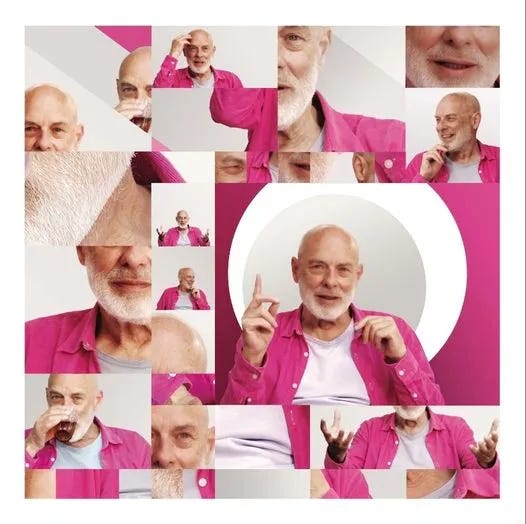
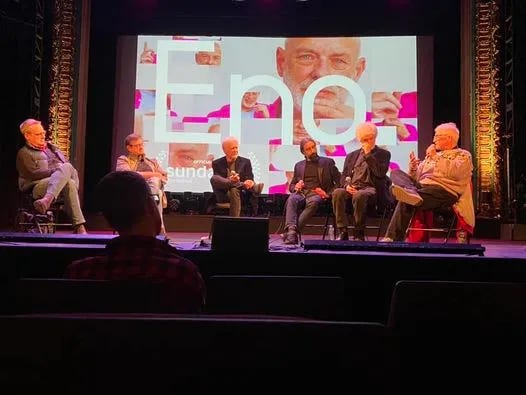
Last week I sat on the far left of a post-screener panel for Gary Hurwitt’s Eno (2024) at the Regent Theatre in Arlington, alongside Jim Sullivan, with Tim Jackson, David Bieber (David Beeber), Michael Howell, and Victor Zappi. The talk proved more stimulating than the film; I worry that Eno looks at Rick Rubin’s elder statesperson status with envy. For my money, the great Eno essay has yet to find publication. Here’s the RBP search results page, which includes a Sullivan Globe interview, doesn’t offer many heavy thinkers, and I admit I have lots of listening to do. I’m still puzzled by how trendy “ambient” music ever got when it openly announces itself as wallpaper. Is it me? Without diving into snark, I’m awaiting enlightenment.
See the regent’s Facebook page for more.
catalog title of the month
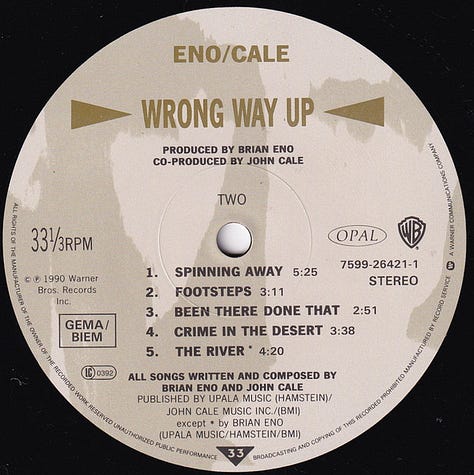
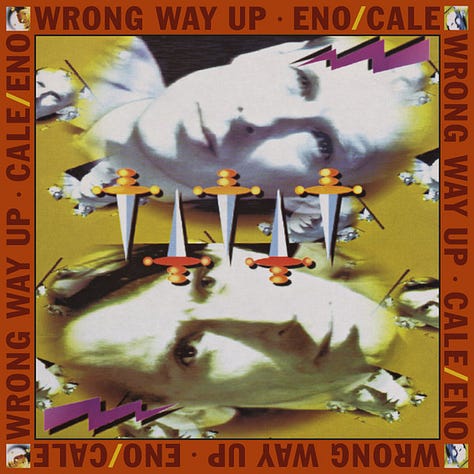
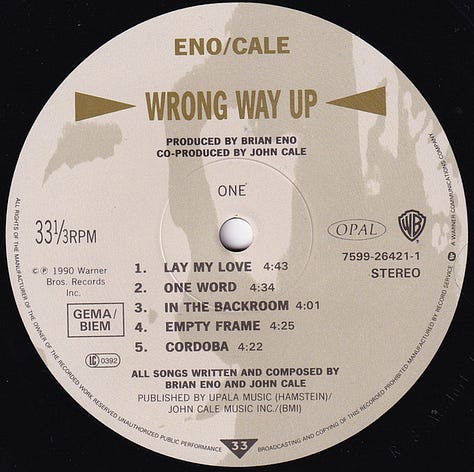
Brian Eno, John Cale, Wrong Way Up (Warners 1990)
For my money, I count this Eno-Cale collaboration (Wrong Way Up, 1990) a useful totem for its light touch and deceptive accessibility. For the record, discogs lists it as “Synth-pop, ambient,” where categories veer into jargon.
hours of mindless fun
My retrotvs lets you click through years, decades, and genres, complete with ads, teasers, and a gazillion pop culture memory holes. Catnip for the soul.
noises off
Review of Randy Newman’s biography by Robert Hilburn from the Los Angeles Review of Books
In the pipeline: 27 CDs leaves cues up never enough on Dylan’s 1974 live box. Numerous “Most Likely You Go Your Way and I’ll Go Mine” rivals “(Like a) Rolling Stone” for redemptive catharsis.
riley rock index: obits, bylines, youtube finds, reference sites, pinterest, beacons.ai, random deep link




